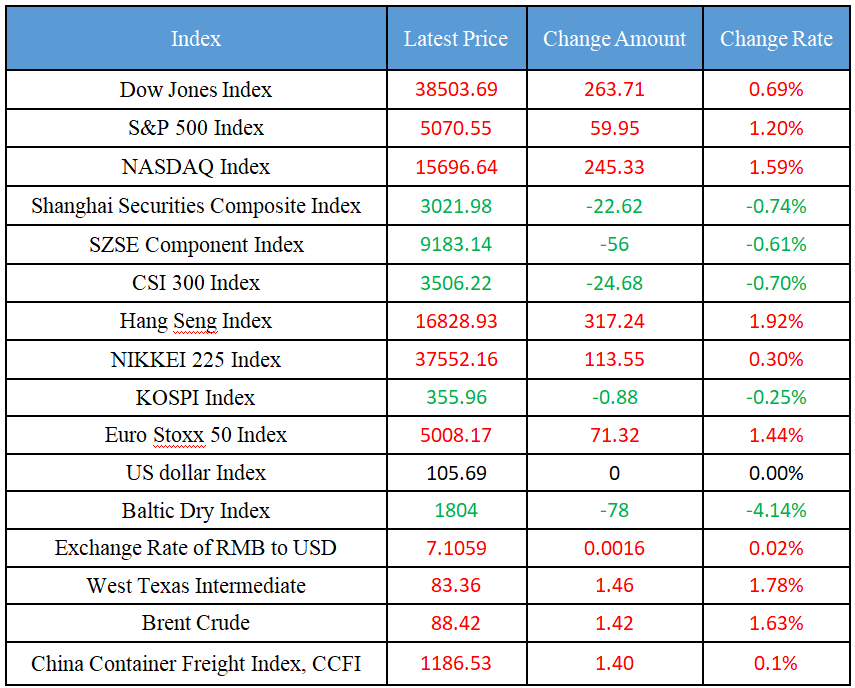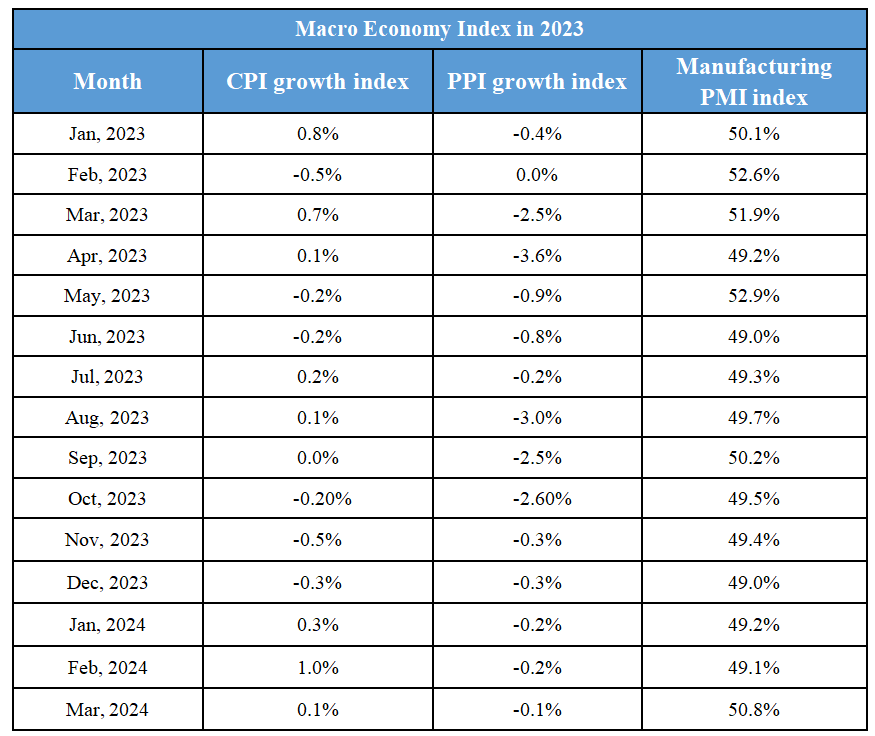April 24th Macroeconomic Index: China's Social Insurance Funds Report Strong First Quarter, Urban Employment Steady
Latest Global Major Index

International Crude Price Trend and Exchange Rate of RMB to USD Trend

Domestic News
1. Ministry of Human Resources and Social Security: From January to March, the total income of the three social insurance funds was 2.2 trillion yuan and the total expenditure was 1.8 trillion yuan
2. In the first quarter, 3.03 million new jobs were created in urban areas across the country
3. There are more than 5,000 AEO enterprises in China, accounting for 36.31% of the total import and export volume
4. Cui Dongshu, Secretary-General of the Passenger Association: China's auto imports fell by 4% year-on-year from January to March
International News
1. Ceasefire negotiations in Gaza are deadlocked, and the outside world speculates that Qatar wants to withdraw from mediation
2. South Korea's shadow banking stress is a warning to global investors
3. WMO: Asia is still the region with the most serious natural disasters in the world
4. Singapore's inflation cooled in March, with the Monetary Authority of Singapore (MAS) keeping its inflation forecast unchanged for 2024
Domestic News
1. Ministry of Human Resources and Social Security: From January to March, the total income of the three social insurance funds was 2.2 trillion yuan and the total expenditure was 1.8 trillion yuan
Chen Feng, spokesman of the Ministry of Human Resources and Social Security, said at a press conference of the State Council Information Office on the 23rd that the reform of the social security system is advancing steadily. The national overall planning of basic pension insurance for enterprise employees, the personal pension system, and the pilot project of occupational injury protection for employees in new employment forms have been implemented smoothly, the supervision and management of social security funds and investment and operation have been continuously strengthened, and the pilot project of direct settlement of work-related injury insurance for cross-provincial and non-local medical treatment has been launched. As of the end of March, the number of people insured by basic old-age insurance, unemployment insurance, and work-related injury insurance was 1.07 billion, 240 million, and 290 million respectively. From January to March, the total income of the three social insurance funds was 2.2 trillion yuan, the total expenditure was 1.8 trillion yuan, and the cumulative balance at the end of March was 8.6 trillion yuan. There are 1.38 billion social security card holders nationwide, covering 98% of the population, of which 986 million have also received electronic social security cards.
2. In the first quarter, 3.03 million new jobs were created in urban areas across the country
According to data released by the Ministry of Human Resources and Social Security on April 23, 3.03 million new jobs were created in cities and towns across the country in the first quarter. According to this year's target of "more than 12 million new urban jobs", one-quarter of the annual task has been completed in the first quarter. In March, the surveyed urban unemployment rate was 5.2 percent, and the employment situation was generally stable.
3. There are more than 5,000 AEO enterprises in China, accounting for 36.31% of the total import and export volume
According to the press briefing held by the General Administration of Customs today, AEO, as enterprises with the highest credit rating of the customs, can enjoy a series of preferential management measures such as priority handling, reducing the frequency of supervision, and optimizing services, so as to effectively reduce the international trade costs of enterprises and enhance their international competitiveness. In the first quarter of 2024, AEO enterprises gave priority to 355,000 customs clearance procedures for import and export goods, implement verification self-inspection results recognition operations, and 2,024 customs declarations of "release before inspection", and the inspection rate of AEO enterprises reduced to 18.9% of the inspection rate of enterprises with conventional management measures. As of the end of March 2024, there were 5,860 AEO enterprises in the country, accounting for 1.19% of the number of enterprises with actual import and export performance and 36.31% of the total import and export value.
4. Cui Dongshu, Secretary-General of the Passenger Association: China's auto imports fell by 4% year-on-year from January to March
Cui Dongshu, secretary general of the China Passenger Car Association, said in a statement on April 23 that China's imported car imports continued to decline from 1.24 million units in 2017 to an average annual rate of about 800,000 units in 2023. From January to March 2024, 156,000 vehicles were imported, down 4% year-on-year, and the downward trend continued. With the continuous growth of China's auto industry, the transformation of electrification has changed the market demand structure, the demand for fuel vehicles continues to shrink, and the demand for imported fuel vehicles has also declined significantly. With the continuous complexity of international relations, it is still necessary to take precautions to establish more import models and maintain a reasonable scale of imported cars.
International News
1. Ceasefire negotiations in Gaza are deadlocked, and the outside world speculates that Qatar wants to withdraw from mediation
Since the outbreak of a new round of Palestinian-Israeli conflict on October 7 last year, Qatar has played an important role in communicating with Hamas. All ceasefire negotiations since the current round of the conflict have also been mediated by Qatar, which facilitated a brief ceasefire between Israel and Hamas late last year and exchanged several groups of detainees. But Qatari Prime Minister and Foreign Minister Mohammed bin Salman recently said that some politicians had "abused" Qatar's participation in brokered ceasefire talks in the Gaza Strip to pursue "narrow political interests", which forced Qatar to be prepared to make a comprehensive assessment of its mediation role.
2. South Korea's shadow banking stress is a warning to global investors
South Korea is becoming a high-profile weak link in the $63 trillion shadow banking world. Cracks have emerged in property exposures both inside and outside South Korea following rising interest rates, prompting financial firms, including Puras and Nomura, to say the pressure on shadow lending to the sector is cause for concern. A key banking group in South Korea nearly doubled its loan delinquency rate last year to 6.55 percent, and Citigroup economists estimate that 111 trillion won ($80 billion) of project finance debt is "in trouble." South Korea's shadow banking financing of the real estate sector increased to a record 926 trillion won last year, more than four times as much as a decade ago, according to the Korea Capital Market Research Institute.
3. WMO: Asia is still the region with the most serious natural disasters in the world
On the 23rd local time, the World Meteorological Organization released the "State of the Asian Climate in 2023" report, which is divided into several parts: climate change and extreme weather have hit Asia hard, long-term warming trend is accelerating, Asia is the world's most disaster-prone region, water-related hazards are the biggest threat, extreme heat is becoming more serious, melting glaciers threaten future water security, and sea surface temperature and ocean heat have reached record highs. Asia remains the hardest-hit region in the world in 2023 due to weather, climate and water-related disasters, the report said. Floods and storms have caused huge casualties and economic losses.
4. Singapore's inflation cooled in March, with the Monetary Authority of Singapore (MAS) keeping its inflation forecast unchanged for 2024
Singapore's core inflation slowed in March, weighed down by lower food prices and service costs. Official data released on Tuesday showed that the core inflation measure, which excludes housing and private transport costs, slowed to 3.1% year-on-year in March. Headline inflation slowed to 2.7% from 3.4% in February, the lowest level in 30 months, with a median forecast of 3.1% in the Bloomberg survey.
Domestic Macro Economy Index














